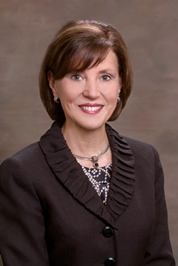On April 11th, Teri will give a Keynote talk at Becker’s Hospital Review 9th Annual Meeting. As part of an ongoing series, Becker’s is talking to healthcare leaders who plan to speak at the conference, which will take place April 11-14, 2018 in Chicago.

To learn more about the conference and Teri’s session, click here.
Question: Who or what are the disruptors that have your attention? Why?
Teri Fontenot: I think the most disruptive forces in healthcare today are technology-based, but the speed in which it is being adopted is what has grabbed my attention. Use of digital technology to monitor patients at home, intervening timely to address potential health events and the accelerating pace of acceptance of virtual visits by consumers and physicians is exciting. The notion that Apple and other innovators in technology will soon offer a cloud-based EHR will be a real game-changer by making health information easier to access, allowing patients to manage their medical records and lowering the cost to providers.
Q: What did you notice about your healthcare experience the last time you were at the receiving end as a patient?
TF: I’m pleased to say that the care was compassionate, prompt and professional, and a full recovery was achieved! But, it was so hard to observe firsthand how incredibly inefficient our health systems remain. The admission was after hours, and some imaging and lab work had been done at an outpatient center earlier in the day. If I had not known who to call to have it sent to the hospital, it would have been repeated. Fortunately, the hospitalist and nurses were focused on avoiding duplication, but I’m confident that if I had been a patient that didn’t know how to navigate the system, the result would have been different. There were also many opportunities for important information to be overlooked. We’ve come a long way in patient safety, but we still have a long way to go until information flow is better coordinated and waste is eliminated.
One of my most cherished patient letters was written by a new father who had to leave his wife and newborn due to a family emergency. He wrote that he was not concerned about leaving her alone at Woman’s because of the care he had observed during her delivery. Patients should not feel they need loved ones with them to guard against preventable harm.
Q: What change in reimbursement is your organization feeling most acutely, and how is it affecting your 2-5-year strategic plan?
TF: Woman’s is the largest Medicaid provider in Louisiana; over 70 percent of the births in the state are covered by Medicaid, and we receive high-risk perinatal and neonatal patients from many underserved areas. Medicaid is our largest payer, and the program has been underfunded for years. Hospitals are currently paid a per diem that is unadjusted for severity for inpatient care. The payment methodology is expected to transition to diagnosis-related groups next year, which has providers very concerned due to the shift in risk and the inadequate post-acute care networks that the five Medicaid managed care organizations currently have in place, which will exacerbate the problem.
Recognizing the increased financial risk and fulfilling our commitment to improve the health of women and infants, our board just approved substantial and sustained funding for comprehensive perinatal care coordination. This population health initiative elevates our current offerings through enhanced screening, treatment and support, especially for patients with behavioral health issues and substance misuse during the pre- and postnatal periods. Our goal is to achieve the March of Dimes ‘A’ score by 2020.
